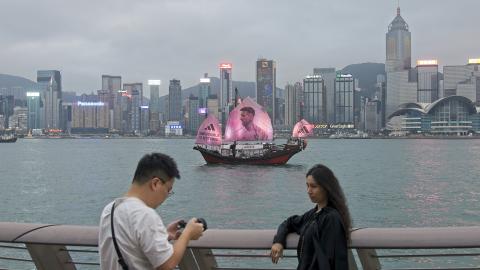The recent furor surrounding Lionel Messi’s absence from a soccer game in Hong Kong provides a striking illustration of China’s deep-seated ideological paranoia and a tendency toward political schizophrenia.
At the heart of this controversy lies the Chinese Communist Party’s profound suspicion of the international community, rooted in a belief of a pervasive and coordinated conspiracy aimed at undermining the communist government. This mindset propels the Communist Party to interpret even the most minor incidents as evidence of a grand scheme against it, often leading to exaggerated and absurd reactions that serve to justify its paranoid worldview — and its aggression and belligerence.
On Feb. 4, the Argentine-born international soccer star Lionel Messi was in Hong Kong with his team, Inter Miami, for a match with a Hong Kong team. Mr. Messi, however, stayed on the substitute bench throughout the game due to what the visiting team’s doctor described as an injury. The disappointed Hong Kong fans discovered that Mr. Messi nevertheless played for 30 minutes in a soccer match in Tokyo a short while later.
Suddenly, this minor sports incident involving Mr. Messi has been seized upon by the Chinese government’s extensive propaganda machine as a symbol of an alleged vast international conspiracy. Mr. Messi’s decision not to play in Hong Kong has been construed as a move orchestrated by myriad forces, each with its own historical and ideological significance to China.
First, the reaction to Mr. Messi’s absence cannot be disentangled from the Chinese leaders’ profound loathing of the recent political developments in Argentina. Argentina’s shift from a long-standing alignment with left-wing political forces toward the free-market stance championed by the newly elected president, Javier Milei, has been a source of contention for the Chinese government.
Mr. Milei’s explicit rejection of socialism and his opposition to Argentina joining the BRICS pact, a coalition seen as an alternative to Western economic dominance and which China aims to lead, represents a direct challenge to China’s influence. Mr. Messi, as a global icon of Argentine identity, has thus become an unwitting participant in this ideological battle, with his not playing in Hong Kong interpreted as a deliberate act of defiance and a statement against China’s political ambitions.
Second, the narrative constructed around Mr. Messi’s club, Inter Miami, further exemplifies the extent of the Chinese Communist Party’s ideological paranoia. Chinese state media announced that the Florida-based soccer club is an anti-communist front organization with collaboration with the CIA.
The Global Times, an official Chinese Communist Party mouthpiece specializing in international affairs and anti-U.S. fanaticism, published a hit piece on Feb. 8 entitled “Messi’s Soccer Club Bosses Have Ties to the CIA,” alleging the father of two of the club’s three owners, brothers Jorge and Jose Mas — the other owner is the retired British soccer star David Beckham — was recruited by the CIA after he fled to Fidel Castro’s Cuba.
The Global Times concluded that “It’s highly unlikely that Messi’s snub to Hong Kong and China was his personal decision. It’s most likely that he acted according to instructions given to him by his bosses (fathered by a CIA agent).”
Thus, Mr. Messi’s absence from the field is framed as part of a broader anti-communist agenda, suggesting a level of international collusion that borders on the fantastical. Such claims reflect the Chinese government’s tendency to view world affairs through a lens of ideological confrontation, where every action is seen as part of a larger battle against communism.
The case of Japan serves as another layer in this complex narrative, with Mr. Messi’s participation in a game in Tokyo following his absence in Hong Kong sparking further speculation and conspiracy theories. Hu Xijin, the Chinese Communist Party’s most notorious and noxious propagandist, tweeted on Feb. 6: “Why didn’t Messi play in Hong Kong or participate in the handshake with HK chief executive? And why did he smile, run freely and looked fit in Japan?”
The Communist Party’s reaction, demanding an explanation and apology from Mr. Messi, underscores a sensitivity to perceived slights and a readiness to interpret individual decisions as politically motivated.
Moreover, the incident touches on the sensitive issue of Hong Kong and its status in China’s political framework. In 2017, upon request, Mr. Messi sent an autographed photo to one of his biggest fans, the jailed 2010 Nobel Peace Laureate Liu Xiaobo via one of Liu’s friends in Hong Kong. China was deeply paranoid about this and regarded Mr. Messi’s action as dangerous and subversive.
On Feb. 7, Regina Ip Lau Suk Yee, a leading Chinese Communist Party proxy in Hong Kong, angrily wrote, “Messi should never be allowed to return to Hong Kong. His lies and hypocrisy are disgusting.” She continued, “Hong Kong people hate Messi, Inter-Miami, and the black hand behind them, for the deliberate and calculated snub to Hong Kong.”
The vilification of Mr. Messi, based on his perceived support for human rights reveals the lengths to which the Chinese Communist Party is willing to go to suppress dissent and maintain its narrative of unity and strength.
All in all, the uproar over Lionel Messi’s not playing in a soccer game in Hong Kong encapsulates the communist worldview as the real force that animates China’s political system. An entrenched ideological paranoia and a propensity for political schizophrenia characterize such a worldview.
The Chinese government’s reaction to this incident reveals not only its deep-seated fears of international conspiracy but also the complex interplay of geopolitics, ideology and individual agency that shapes its engagement with the world. It serves as a perfect illustration of the ideological absurdity at the heart of China’s political landscape. With it, an international superstar is now an international supervillain against the socialist motherland of China.















